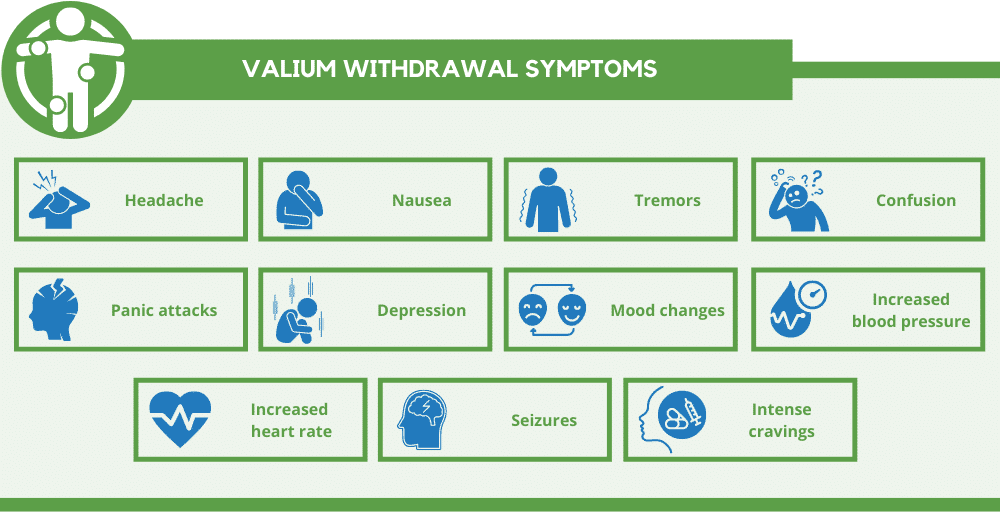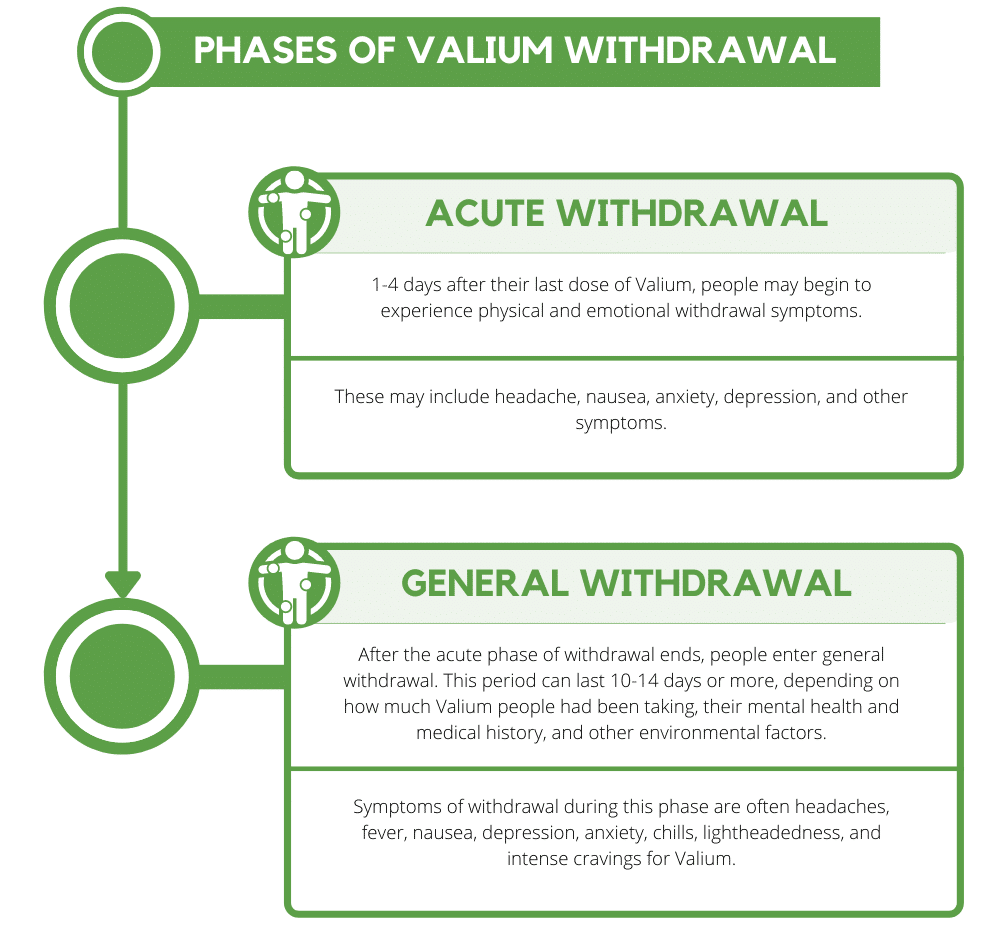What to Expect at a Valium Detox Program in Charlotte, NC

Medically Verified: 2/1/24
Medical Reviewer
Chief Editor

All of the information on this page has been reviewed and verified by a certified addiction professional.
Many people who suffer from anxiety take medication to help them manage their symptoms. One of the most commonly prescribed anti-anxiety medications is Valium. Valium (diazepam) can be effective at dulling the intense physical and emotional symptoms of anxiety, which can include sweating, shaking, nausea, racing thoughts, and interrupted sleep.[1]
However, Valium is in a class of drugs called benzodiazepines. Benzodiazepines are known to be highly addictive because they produce a high, euphoric feeling when taken. People may take benzodiazepines like Valium recreationally to get this effect, or they may take more than prescribed by their doctor.
An addiction occurs when someone develops a dependence on a drug or medication. Over time, the person may experience harmful physical effects of taking too much of the drug. They may also suffer serious damage to their mental, social, and financial health.
Whether someone takes Valium as a prescription or uses it recreationally, they should be aware of the signs of addiction and get treatment as soon as they recognize that they have a problem. The sooner people start participating in a Valium detox program in Charlotte, the better chance they have at a complete recovery.
Recognizing the Symptoms of Valium Addiction
The symptoms of an addiction may be difficult to recognize, and people often try to cover up or hide this condition out of fear, guilt, or shame. The more you know about the signs of addiction, the better you’ll be at spotting it in a loved one–or yourself.
Symptoms of addiction to Valium include:
- Taking more Valium, or taking it more often, than prescribed
- Taking Valium without a prescription
- Needing more Valium to get the same effect
- Hiding or lying about your substance use
- Falling behind at work, school, or in your responsibilities at home
- Experiencing legal or financial trouble related to your substance use
- Continuing to use despite experiencing negative consequences
- Having withdrawal symptoms if you attempt to stop taking Valium
If you recognize any of these behaviors in yourself or someone you love, it is important to seek professional treatment right away. Although detox programs only address symptoms of withdrawal, they can also refer you to a treatment program that meets your needs and can help you overcome Valium addiction.
Do I Need to Go to a Valium Detox Program in Charlotte?
People who abuse Valium are at heightened risk for serious health complications and overdose. The discomfort and cravings that people experience during withdrawal from Valium make it very difficult to stop using it on your own.
Some of the symptoms of Valium withdrawal include:[2]

- Headache
- Nausea
- Tremors
- Confusion
- Panic attacks
- Depression
- Mood changes
- Elevated blood pressure and heart rate
- Seizures
- Intense cravings
Many people find that, without support and treatment that includes medications, it is nearly impossible to get through the process of withdrawal from Valium on their own. Not only that, but seizures can be life-threatening. As a result, people should seek help from a benzodiazepine detox center any time they are detoxing from Valium.
Having a complete, safe, and comfortable withdrawal from Valium requires a comprehensive Valium detox program where people can get the care and monitoring they need.
What Happens in a Valium Detox Program in Charlotte?
People have different experiences in detox because the severity of withdrawal symptoms often depends on the length and severity of the person’s addiction. In general, there are two phases of withdrawal from Valium.
- Acute withdrawal: 1-4 days after their last dose of Valium, people may begin to experience physical and emotional withdrawal symptoms. These may include headache, nausea, anxiety, depression, and other symptoms.
- General withdrawal: After the acute phase of withdrawal ends, people enter general withdrawal. This period can last 10-14 days or more, depending on how much Valium people had been taking, their mental health and medical history, and other environmental factors. Symptoms of withdrawal during this phase are often headaches, fever, nausea, depression, anxiety, chills, lightheadedness, and intense cravings for Valium.
During a Valium detox program, people are monitored and treated for uncomfortable or dangerous symptoms of withdrawal. Nurses provide around-the-clock supervision and monitoring to help prevent medical complications. Similarly, doctors can prescribe certain medications that reduce the severity of withdrawal symptoms. There are several medications people may receive as part of their program, including:
- Benzodiazepines to help control some of the symptoms of withdrawal by slowly tapering the body off of them
- SSRIs (Selective Seratonin Reuptake Inhibitors) for anxiety and depression
- Melatonin for anxiety and agitation
- Anticonvulsants for seizures
- Muscle relaxants for anxiety and general discomfort
These medications can help keep people comfortable as they go through detox, which gives them a better chance at completing the process. Without proper treatment and monitoring during the detox period, it is highly unlikely that someone will have a complete, safe withdrawal from Valium.
Find a Valium Detox Program in Charlotte, North Carolina Today
If you or someone you care about is struggling with substance abuse, including addiction to Valium, you are not alone. The staff at Charlotte North Carolina Detox know that anyone can recover from addiction if they have the right care and support. That is why we offer high-quality benzodiazepine detox services and work with people to get them the treatment they need and deserve.
Most people do not get the treatment they need to overcome addiction and live a healthier, more fulfilling life. You do not have to struggle with your addiction alone. Reach out to the staff at Charlotte North Carolina Detox to learn more about our services. Call today.
References:

